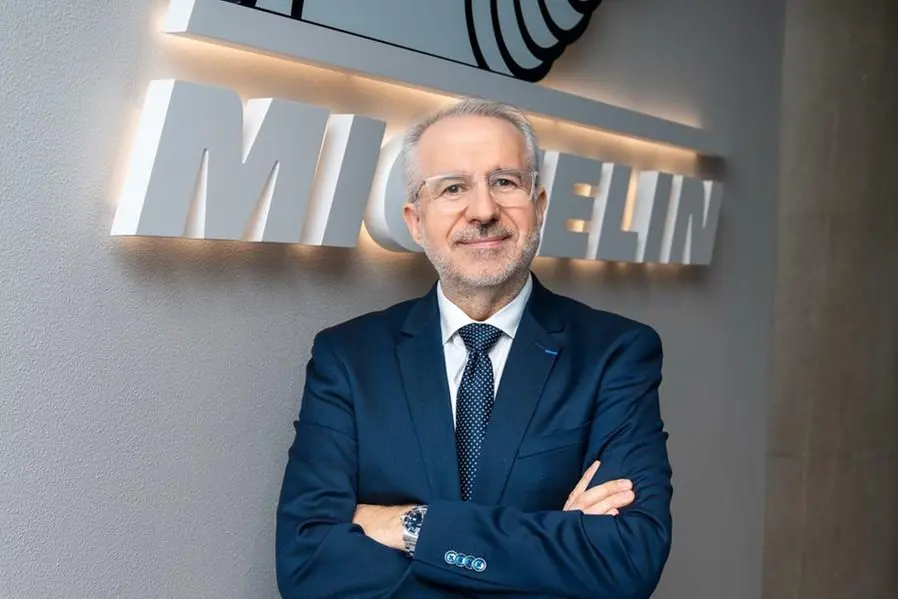In an exclusive conversation on the sidelines of the Dubai Autodrome event, organized in collaboration with General Motors, Cedric Binoit, Managing Director and Vice President of Marketing & Sales for Michelin Middle East and North Africa (MENA), shed light on the company’s ambitious vision for the electric vehicle (EV) era. Speaking about Michelin’s strategy in sustainability, product innovation, and partnerships, Binoit discussed how the French tire giant is positioning itself as a key player in the global shift toward electrification. He also revealed details about Michelin’s new campaign, “Trust Your Tires Longer,” and reaffirmed the company’s commitment to quality, safety, and environmental responsibility — values that have defined the brand for more than a century.
What is the main idea behind your collaboration with General Motors in this event?
The story behind this event is quite clear. When I first arrived in the UAE two months ago, I asked my team about the electrification movement in the region. They told me there would soon be an event with a major brand, GM, and asked if we should partner. I immediately said yes — it’s a great opportunity to combine the strength of both brands and showcase our expertise in electrification. It’s all about highlighting the power of innovation and technology in this new era.
Many EV manufacturers do not use Michelin as their standard tire, but EV owners — especially of top brands like Tesla — often choose Michelin. What makes Michelin special for EV drivers?
That’s a great question. We are now launching a new global campaign called “Trust Your Tires Longer.” It focuses on durability, longevity, sustainability, and efficiency. For EVs, people often think fuel efficiency doesn’t apply, but in fact, rolling resistance plays a key role — it directly affects battery range. Tires account for up to 15% of an EV’s driving range. So, choosing the right tire can make a huge difference; the wrong one could reduce that range significantly.
Will Michelin expand partnerships beyond GM to other automotive brands in the region?
Absolutely. Michelin is a brand that collaborates with all major car manufacturers worldwide. GM is iconic, but we are open to partnerships with any brand that shares our commitment to quality and innovation.
Beyond events like this one, what marketing strategies are you using to attract EV owners to Michelin?
We have a comprehensive global marketing strategy. Our new “Trust Your Tires Longer” campaign is a key part of it. The goal is to help consumers understand that choosing Michelin means making no compromises — whether you drive an EV, SUV, or family car. You always get the best total performance.
Recycling is becoming a major concern, especially in the Middle East, where tire recycling facilities are still limited. What steps is Michelin taking globally in this area?
Michelin has been a pioneer in tire recycling. Recently, we invested in a Swedish company called Enviro, which focuses on tire-to-tire recycling — closing the loop completely. This commitment is part of Michelin’s DNA. Although I’m still new to the region and need to assess local initiatives, any opportunity for sustainable action here will be of great interest to us. For Michelin, it’s unthinkable to sell tires without considering their end-of-life impact.
Michelin is known for premium quality, but prices can be a challenge, especially with currency fluctuations. How do you convince customers to choose Michelin despite higher prices?
We emphasize total performance. Yes, our tires might cost more than some lower-tier brands, but we provide a balance between safety, sustainability, and peace of mind. I recall an influencer once saying cheaper tires are better because they cost less, but she overlooked safety and braking distance — especially important in extreme weather conditions like those in the Middle East. Safety and durability are priceless.
How does Michelin ensure its tires meet GCC quality specifications, especially for the region’s climate and EV needs?
We have dedicated teams in every market, ensuring our tires comply with local standards. In the Gulf, our homologation team carefully tests and certifies each size and range to make sure the tires are fully compatible with the local climate and performance requirements. For Michelin, it’s simply out of the question to release a product that doesn’t meet the right specifications for its market.
Finally, what can we expect from the next generation of Michelin tires?
The next generation of Michelin tires will be fully recycled and recyclable. By 2050, 100% of the materials used in Michelin tires will be either renewable or recycled. This is a central part of our long-term sustainability strategy and reflects our vision for the future of mobility.




